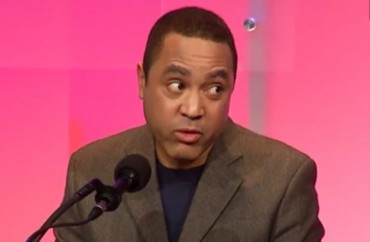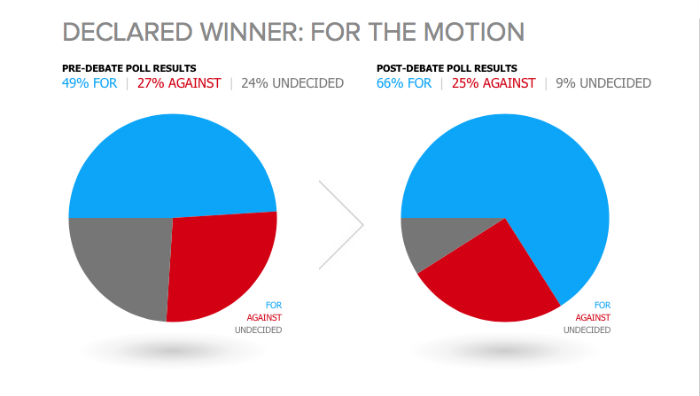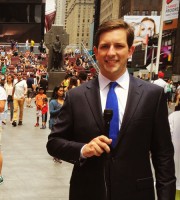
Portrayed as ‘ignorant at best and immoral at worst,’ non-leftist students self-censor
In recent weeks, speakers such as conservative Ben Shapiro and anti-feminist Milo Yiannopoulos have faced angry crowds of progressive students who tried to shut down their campus speeches with interruptions and physical confrontations.
Yet it took an evening of civil debate between scholars and writers to convince a divided Yale University audience that “free speech is threatened on campus.”
The public radio show and podcast Intelligence Squared U.S. hosted the Tuesday evening Oxford-style debate at Yale, moderated by ABC News correspondent John Donvan.
Students taught that ‘shaming people and shutting them down’ is OK
“Speech policing of faculty, students and speakers has become routine,” though campus speech codes go back decades, said writer and lawyer Wendy Kaminer, arguing in favor of the motion that free speech is threatened.
Despite President Barack Obama criticizing “the clampdown on student speech,” Kaminer said, “his own administration is responsible for some of it,” particularly through the guidance documents issued by the Department of Education. “Title IX has been turned into an ad hoc national speech code,” she added.
"Words are weapons – that's precisely why we protect them."—Wendy Kaminer on college #freespeech. #IQ2USLive https://t.co/qI1kHyBz4i
— Open to Debate (@OpentoDebateOrg) March 2, 2016
Since the race riots in Ferguson, Mo., that followed the shooting death of black teenager Michael Brown, the argument “has become higher pitched … in favor of a leftist position, and I’m glad,” said John McWhorter, a linguistics professor at Columbia University and Kaminer’s pro-motion partner.
“However, what we are too often being told is that the leftist position is truth incarnate” and that “there can be no further debate,” McWhorter said.
RELATED: Scenes from a campus mob showdown: Decidedly not a safe space
“I’m afraid what we are seeing on one campus after another is an idea that shaming people and shutting them down via the ample use of buzzwords, and slogans, and sonorous cadence is somehow OK when it comes to espousing a leftist agenda,” he said. “It’s as if we are at the end of ideas.”
Fear of being called racist is silencing #freespeech on campuses argues @JohnHMcWhorter. #IQ2USLive https://t.co/ADCeF1TXBo
— Open to Debate (@OpentoDebateOrg) March 2, 2016
It’s actually ‘students of color finally exercising their freedom of speech’
It is “actually the ones who criticize these students for being crybullies who are the threats to free speech,” retorted Jason Stanley, a philosophy professor at Yale, arguing against the motion. He said that “free speech is alive and well in America’s universities,” and pitting “anti-racism” advocacy against free speech is a “false dichotomy.”
Shaun Harper, executive director of the Center for the Study of Race and Equity in Education at the University of Pennsylvania, said the protests that erupted on “predominantly white campuses” such as the University of Missouri “were students of color finally exercising their freedom of speech.”
RELATED: Blood paint and vandalism greet anti-feminist troll Milo Yiannopoulos at Rutgers
Such students are simply educating their peers about the consequences of their words, Harper said: “Surely John and Wendy do not believe that we should not send college-educated persons out into the world without some understanding of how their speech and actions might unknowingly harm others.”
Does the left feel under attack on college campuses? #freespeech #IQ2USLive https://t.co/KH8KoSgXZt
— Open to Debate (@OpentoDebateOrg) March 2, 2016
Seizing on the presentation of the issue by Columbia’s McWhorter, Yale’s Stanley said that leftism is “the underlying issue” when it comes to speech debates.
“This isn’t a new point,” Stanley said: The renowned leftist “Noam Chomsky told me he has never been invited to a political science department to speak, despite his many, many books” on political theory. Yet Stanley’s own conservative students are willing to confront him about his leftism in class, Stanley said, describing his response: “‘I’m sorry, I’m going to try to not do that agenda’” in class.
McWhorter responded that the new problem is “not that the Left is wrong,” but “when the idea seems to be that if you don’t agree with the leftist position, then you are ignorant at best and immoral at worst.”
Protesting conservatives on campus: a threat to #freespeech? #IQ2USLive https://t.co/linF3B6DdM
— Open to Debate (@OpentoDebateOrg) March 2, 2016
Nothing wrong with criticizing affirmative action: ‘Don’t just withdraw’
Asked by an audience member whether speech in a “social setting” can be legitimately censored without it affecting the speech of “tenured professors … in an academic setting,” Harper said he didn’t want “anyone’s speech to be suppressed in any setting.”
Using the example of a fraternity party, Harper said: “If someone says something that sounds a bit off color, I would want one of his fraternity brothers or someone at his party or whatever to engage him in a conversation about it,” not for the purpose of “shutting him down” but to further the conversation.
“What I am saying is that if you have the perhaps seemingly unpopular view about affirmative action, don’t shut yourself down, don’t just withdraw from the conversation because you’re scared that no one is going to like your position,” he said. “Put your position in there, continue to fiercely debate it.”
Kaminer and McWhorter ended up winning over the audience. Asked before the debate if free speech was being threatened, 49 percent of respondents agreed while the rest were closely divided between “no” and “undecided.”
In a post-debate poll, the undecideds plummeted to 9 percent, the “no” respondents dropped a couple percentage points, and the “yes” voters jumped to 66 percent.
RELATED: Campus debate convinces: Liberals stifle intellectual diversity on campus
Like The College Fix on Facebook / Follow us on Twitter
IMAGE: Intelligence Squared U.S.






Please join the conversation about our stories on Facebook, Twitter, Instagram, Reddit, MeWe, Rumble, Gab, Minds and Gettr.